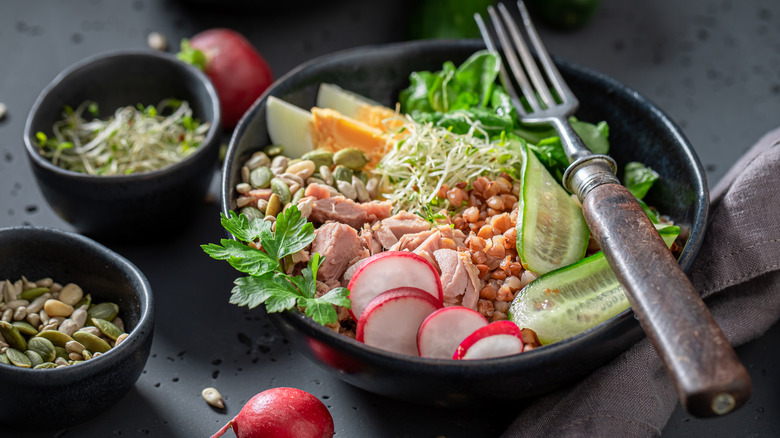What Separates A Summer Salad From A Winter Salad?
It's no secret that for a lot of people, certain foods really only mesh with certain times of the year. Sure, no one is technically stopping you from a warm, nourishing bowl of soup in July, but for many, the idea of eating what is clearly a cold weather food during a heat wave is absolute madness. People who feel this way likely also believe that salads are clearly a summer food, a mix of light flavors designed as a lunch that doesn't weigh you down.
But the thing is, salad really is an every time of year food — it just depends on what you put in it. Maybe you don't want to eat the same kinds of salads during the warmer months that you do during the dead of winter (although let's be real, is there ever really a bad time for a Caesar salad?), but changing your ingredients up makes a reason for the season. Winter salad ingredients are certainly heartier (and sometimes warmer), but they're no less a salad for it.
Winter salads are all about heartier ingredients
The summer salad ethos is pretty simple here: You want something light and airy that isn't going to give you heartburn or lay you out for the rest of the day. After all, it's hot out! This is why you'll see things like a Caprese salad with its bright blend of creamy mozzarella, aromatic basil, and acidic tomatoes, kale salads, or any number of mixed greens, perhaps with some tropical fruit like mango or pineapple tossed in.
Winter salads, on the other hand, are all about hearty ingredients that carry you through cold weather. The salade nicoise is one of the classic winter salads for this reason. Sure, it still has lettuce, but when you throw in heavier winter ingredients like potatoes, hard-boiled eggs, tuna fish, olives, and green beans, your flavor profile is going to change significantly. Components like these fill you up and keep you going through those sub-freezing temperatures. Creamier ingredients (not just eggs, but cheeses like gorgonzola or something like chickpeas) are often associated with winter as well.
Winter salad ingredients are largely psychological
While you're not likely to find a winter salad full of mangoes and strawberries, there are certain fruits that do appear heavily in winter concoctions, like pears and grapefruit. Here, what the ingredients make you think of is just as important as how they actually taste — a tropical fruit is going to make you think of summer; a pear, not so much.
The other thing you're far more likely to see in winter is salads served warm. True, a salad any time of year can have a warm component (witness the glory that is a chicken Caesar) but during winter, you're far more likely to see a salad whose entire flavor profile is based on warmth. It's obviously not universal — the wedge is a classic winter salad — but it makes sense that winter salads are going to be used to warm you up, just like a bowl of chicken noodle soup.
Really, though, a lot of this just comes down to personal preference. Plenty of people will enjoy any type of salad at any point in the year; don't feel you're limited to certain dishes during certain months. Much like no one can stop you from eating breakfast for dinner, you're a grownup, and nobody can tell you not to have whatever salad you want whenever you want it.


